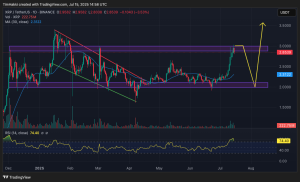
Thailand launched its “TouristDigiPay” scheme on Monday, August 18, allowing foreign visitors to convert crypto into Thai Baht for electronic payment across the country.
The initiative operates within a regulatory sandbox framework with strict Know Your Customer requirements and monthly spending limits to prevent financial crime while boosting tourism revenues.
Government Coalition Targets Tourism Recovery Through Digital Innovation
According to a local report, Deputy Prime Minister and Finance Minister Pichai Chunhavajira unveiled the program alongside officials from the Finance Ministry, Securities and Exchange Commission, Anti-Money Laundering Office, and Ministry of Tourism and Sports.
The launch addresses a significant tourism slowdown this year, primarily due to declining Chinese visitor numbers.
The system requires tourists to open accounts with SEC-regulated digital asset businesses and Bank of Thailand-regulated e-money providers.
Participants must pass stringent customer due diligence checks and can only exchange digital assets for baht through licensed operators, using converted funds via QR code payments and other electronic methods.
The program prohibits direct cash withdrawals and limits participation to foreign tourists temporarily staying in Thailand.
The SEC completed public consultation on using financial innovation and digital assets for economic and tourism growth, with feedback periods also closed on August 13.
Regulatory Framework Builds on Broader Crypto Integration Strategy
Thailand’s tourist crypto payment system expands on the regulatory groundwork laid throughout 2025, including a five-year personal income tax exemption on digital asset capital gains approved by the Cabinet in June.
The tax break applies only to transactions through SEC-licensed platforms from January 1, 2025, to December 31, 2029.
The exemption aims to position Thailand as a leading digital asset hub while generating over 1 billion baht in additional tax revenue through indirect economic activity.
Deputy Finance Minister Julapun Amornvivat said the policy targets foreign capital attraction and digital asset market stimulation.
Thailand simultaneously tightened regulatory oversight by blocking access to five major cryptocurrency exchanges in May, including Bybit, CoinEx, and OKX, for operating without licenses.
The SEC cited investor protection and money laundering prevention as primary concerns for the crackdown.
The regulator also launched $150 million worth of digital investment tokens called “G-tokens” in May, allowing retail investors to purchase government bonds via blockchain-based tokens with minimum investments of just $3.
The initiative broadens access to government-backed investment opportunities historically limited to institutional investors.
Global Crypto Tourism Trend Gains Momentum Across Asian Markets
Thailand’s crypto payment system follows similar initiatives across Asia, with Bhutan leading the charge by launching the world’s first national-level crypto tourism payment system in May.
Bhutan partnered with Binance Pay and DK Bank to enable payments for airline tickets, visa fees, hotel stays, and even roadside fruit stalls using over 100 cryptocurrencies.
Bhutan’s system onboarded more than 100 local merchants and settles transactions instantly in local currency without gas fees.
The initiative addresses persistent tourist issues, including high transaction fees, currency exchange costs, and limited international card acceptance, while providing payment infrastructure access to rural artisans and small vendors.
Similarly, France’s Riviera region has recently implemented crypto payment options across over 80 businesses through Binance Pay’s partnership with fintech company Lyzi.
Customers can pay using stablecoins and other cryptocurrencies at hotels, restaurants, and luxury retailers in Cannes, Nice, Antibes, and Monaco via QR code scanning.
The Tourism Council of Thailand expressed concerns about ecosystem readiness and stakeholder awareness during the consultation process.
Vice President Bhummikitti Ruktaengam highlighted that many Phuket stakeholders remained unaware of the ongoing consultation, while money laundering risks persist with increasing illicit foreign business operations.
Thailand’s digital asset regulatory adjustments include proposed changes to listing criteria for local exchanges, requiring public disclosure of related-party connections for exchange-issued tokens.
The SEC board approved changes in June to align listing standards with usage patterns, technological development, and industry structure.
The country listed Tether’s gold-backed token XAU₮ on Maxbit exchange in May, marking the first tokenized physical gold offering in Thailand’s market.
Each token represents ownership of one troy ounce of physical gold stored in secure vaults, expanding investment options for Thai traders.






